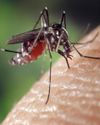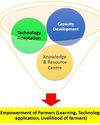
A major health benefit these provide is to protect the gut against invading pathogens (diseasecausing microorganisms) that could cause harmful infections. But up to now, how this protective effect comes about has been unclear, and whether certain bacterial species have a more important role than others.
To investigate this, researchers at the University of Oxford tested 100 different gut bacteria strains individually and in combination for their ability to limit the growth of two harmful bacterial pathogens: Klebsiella pneumoniae and Salmonella enterica.
Individual gut bacteria showed a very poor ability to restrict the spread of either pathogen.
But when communities of up to 50 species were cultured together, the pathogens grew up to 1000 times less effectively than when cultured with any individual species.
This story is from the {{IssueName}} edition of {{MagazineName}}.
Start your 7-day Magzter GOLD free trial to access thousands of curated premium stories, and 9,000+ magazines and newspapers.
Already a subscriber ? Sign In
This story is from the {{IssueName}} edition of {{MagazineName}}.
Start your 7-day Magzter GOLD free trial to access thousands of curated premium stories, and 9,000+ magazines and newspapers.
Already a subscriber? Sign In

An insight into Chandipura virus in India
Recently lot of news regarding disease due to Chandipura virus has emerged in various newspapers/magazines. After reading the reports published it seems that thing is still brewing in the natures nest and it could affect mankind.

Why elephants never forget?
An elephant has a very large brain for its size and the 'temporal lobe' region responsible for memory is more developed with a greater number of folds - this results in powerful abilities to 'download' important survival data such as where to find food and water, and who is friend or foe.

Use of Algae for Wastewater Treatment Containing Heavy Metals
Wastewater treatment is a critical environmental issue particularly when it comes to the removal of heavy metals.

Nano priming Seeds: A Small Innovation Sparkling Big Advances in Germination
Nanopriming is an emerging agricultural technique where the seeds are treated with nanoparticles to improve their germination, growth, and overall performance.

Nobel Laureates in Physics 2024: Revolutionizing AlThe Physics Foundations Behind Machine Learning
This year's two Nobel Laureates in Physics have used tools from physics to develop methods that are the foundation of today's powerful machine learning.

Revolutionizing Biology: The 2024 Nobel Prize in Chemistry Celebrates Breakthroughs in Protein Design and Structure Prediction
The Nobel Prize in Chemistry 2024 is about proteins, life's ingenious chemical tools.

New findings on animal viruses with potential to infect humans
Scientists investigating animal viruses with potential to infect humans have identified a critical protein that could enable spillover of a family of organisms called arteriviruses.

Father-Daughter Team Decodes Mars' Alien Signal
There is no definitive answer to whether aliens exist, but there is a lot of work being done to find out:

Krishi Vigyan Kendras: Working for Farmer's Welfare
Krishi Vigyan Kendras (Farm Science Centres) are the District level institution serving as an agriculture knowledge resource & capacity development centre which plays indispensable role in front line extension regarding agriculture system in scientific way.

Sixth generation Computer: The future computing technology
We are in a transition towards a digital world, where everything will be dealt with in digital format.